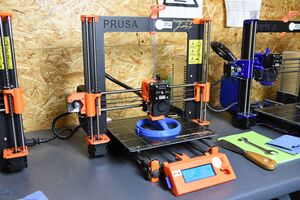Prusa i3 MK2S (1): Difference between revisions
From CoMakingSpace Wiki
NitramLegov (talk | contribs) m Headline |
NitramLegov (talk | contribs) m Dangers are to be maintained in introduction; Add note for magnetic bed |
||
| Line 15: | Line 15: | ||
}} | }} | ||
The Prusa i3 MK2S is our default 3D printer. We have five of them, named "P1" through "P5". | The Prusa i3 MK2S is our default 3D printer. We have five of them, named "P1" through "P5". Please note that P1 has received an upgrade and now has a magnetic board. | ||
In addition to receiving a [[3D Printer Introduction|personal introduction]] from one of the tutors, make sure that you have read the [http://prusa3d.com/downloads/manual/prusa3d_manual_mk2s_en.pdf handbook] and use the latest version of [[Slic3r]] available at the [https://www.prusa3d.com/drivers/ drivers and manuals page]. | In addition to receiving a [[3D Printer Introduction|personal introduction]] from one of the tutors, make sure that you have read the [http://prusa3d.com/downloads/manual/prusa3d_manual_mk2s_en.pdf handbook] and use the latest version of [[Slic3r]] available at the [https://www.prusa3d.com/drivers/ drivers and manuals page]. | ||
Revision as of 10:03, 5 August 2022
Prusa i3 MK2S
| MachineInfoBox Original Prusa i3 MK2S | |
|---|---|

| |
| Synonyms: | Prusa i3 MK2 (nearly identical) |
| Material: | plastic filament |
| Access Requirements: | |
| Software: | Slic3r Prusa Edition |
| Firmware: | https://www.prusa3d.com/drivers/ |
| Manual: | prusa3d.com |
| Tutors: | |
The Prusa i3 MK2S is our default 3D printer. We have five of them, named "P1" through "P5". Please note that P1 has received an upgrade and now has a magnetic board.
In addition to receiving a personal introduction from one of the tutors, make sure that you have read the handbook and use the latest version of Slic3r available at the drivers and manuals page.
The build volume of this model is 250 × 210 × 200 mm.
Dangers
- exposed heated parts - may still be hot if the display is already turned off!
- the print head reaches temperatures up to 230 °C during operation
- the bed reaches temperatures up to 100 °C during operation
- machine parts may rapidly change direction - do not reach in when a print is running!
- machine may keep executing its commands after something went wrong
- every move is based on the initial homing ("zero-ing")
- no sensing of obstacles or current position!